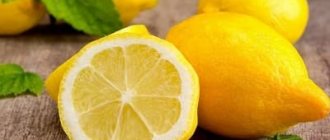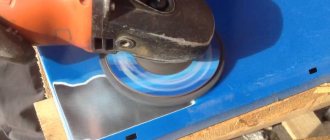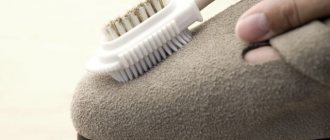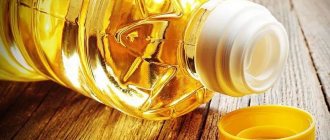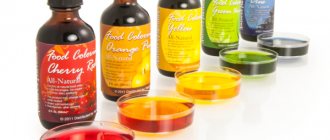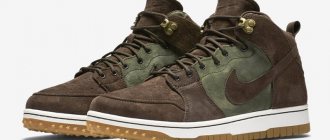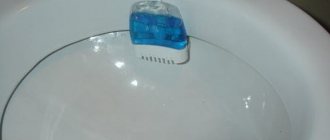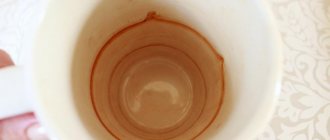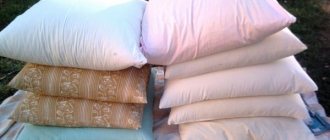Useful tips
Toothbrushes should be changed every 2-3 months, and sometimes even more often.
However, where to put the used brush? Many people simply throw it away.
However, you should not immediately resort to such measures, because an old toothbrush can be used for other purposes.
In this collection you can find the most useful tips for using an old toothbrush, and you will be surprised at how many options there are and what other benefits it can bring you.
Using a toothbrush
Old, out-of-print toothbrushes are used:
For cleaning grout between wall and floor tiles from dirt. For this purpose, cut off the top with bristles. Drill holes in the middle for an electric drill and use a homemade cleaning device to quickly remove all dirt and build-up in the tile joints and corners. When washing the soles of shoes. The bristles will remove all the dirt from the embossed surface. And if you brush the white sides of your sneakers and sneakers with toothpaste, not a trace of dirt will remain. For cleaning the inside of narrow bottles. For removing dust, spills and crumbs from between keyboard buttons. Together with anti-stain products, it will cope with dirt on the carpet and rug. For removing fresh stains from clothes
A drop of detergent is placed on the dirty area and rubbed gently with a brush. Do the same with stains on upholstered furniture.
For cleaning complex surfaces. When washing a mosquito net, place the net in the bathtub, water it from above from the shower and wash it, removing twigs, dried insects, and dirt from the cells using a toothbrush. A simple device is useful for removing dust from blinds. 2 old brushes are fastened together using tape with bristles opposite each other and passed along the strips of the blinds, grabbing the top and bottom. Bicycle chains are cleaned of dirt in the same way. When washing small tea strainers and meshes in juicers. For cleaning small parts, such as handles on a gas stove and kitchen furniture. For cleaning the insides of electric kettles and hard-to-reach places in appliances. When washing an aquarium, the bristles will wash both the walls of the tank and decorative elements (stones, sunken ships, castles). When cleaning a comb from hair. When peeling young potatoes and hairs from corn. When cleaning soft parts from dust (earphone membrane). For cleaning gold, silver jewelry and jewelry. The decorations are placed in a glass of water, where a few drops of detergent and 1-2 drops of ammonia have previously been placed. Leave for 20-30 minutes. Then clean the surface under running water with a toothbrush. For brushing long hair on dogs. For children's drawing. For various crafts with children. For cleaning the car interior. For washing and cleaning taps and shower heads from limescale. For making wobblers. Watch a very useful video on what to do with old toothbrushes.
Attention!
A heated brush bent at a 90-degree angle is used to clean the area under the toilet rim.
Beauty Application
Old toothbrushes:
- apply hair dye;
- apply hair styling product to hair;
- apply cosmetic oil to the lips and massage with a brush with light movements;
- a mixture of soda and salt is applied to the steamed face and massaged, removing the stratum corneum and blackheads;
- lubricate eyebrows and eyelashes with castor oil for care;
- tint eyebrows or apply gel to shape them;
- clean their hands and nails after working in the garden. It is better to use a solution of citric acid, take a few crystals and dissolve in 1 tbsp. This composition will wash away all the dirt ingrained into the skin;
- remove pieces of mascara from eyelashes.
Making jewelry (bracelets)
To make bright bracelets for the summer, brushes with bright transparent handles are used. In addition to brushes, you will need a pan of boiling water, a towel, and tongs. Manufacturing process:
- All bristles are pulled out of the brushes.
- Dip into boiling water for 1 minute, take it out, wrap it in a towel and bend it over your hand. If you cannot immediately give the product the required shape, dip one or the other end into boiling water for a few seconds.
- If a twisted decoration is required, then after removing it from the water, the product is twisted around its axis.
Useful tips - how to apply
What can you use a toothbrush for, if not for its intended purpose - Top 20 useful tips:
- Cleaning tile joints - it is much more convenient to clean out mold, dust, traces of glue and other contaminants between tile joints both on the floor and on the walls. To do this, you need to cut off the plastic handle and attach the plate with bristles to a regular screwdriver;
- Cleaning the sole – the teeth do an excellent job of removing dried dirt in the nooks and crannies of the sole, as well as between the seams on the material;
- Cleaning the keyboard - especially in the gaps and spaces of individual keys;
- Carpet cleaning – together with powerful stain removers, a toothbrush will help keep the pile of your home carpet clean and renewed;
- Removing stains from furniture and clothing - copes with the removal of small traces of grease, coffee, wine, glue, etc.;
- Removing dust from blinds and mosquito bars - quickly and effectively cleans every part;
- Washing vegetables - bristles do an excellent job of removing dirt from the skins of potatoes, carrots, corn or beets. This way you will wash the peel much faster and start preparing a delicious dish;
- Hair coloring – with a brush it is much easier to color the roots, as well as individual strands;
- Applying hair styling products - it’s convenient to apply foams and mousses, create volume and style strands. This way the bangs will be smoother, and small hairs will not stick out and bristle on the sides;
- Peeling facial skin - before using bristles for cosmetic purposes for beauty procedures, you should first disinfect it, for example, with chlorhexidine. Massaging the face with a soft brush helps improve blood circulation and remove dead dermal cells;
- Cleaning hard-to-reach places of household appliances and equipment - for example, coffee grinders, juicers, coffee makers, microwaves, multicookers, kettles, meat grinders, graters, etc.;
- Cleaning tools and bicycle chains will prevent rust from forming on the surface;
- Assistance with manicure and makeup - combing eyebrows, removing excess mascara from eyelashes or blush from cheekbones;
- Handles or hooks for tools - for this, the brush is cut into two parts, a hole is made inside using a hot knitting needle, and the metal part of a screwdriver or other tool is inserted into the plastic handle;
- Cleaning the aquarium - both the walls and the decorative elements inside: fish houses, stones, shells, etc. An old brush is also used to create fishing items, for example, a wobbler (bait for catch);
- Cleaning soft parts - for example, telephone speaker, headphones, hair dryer filter, etc.;
- Crochet accessories - handles can be turned into a real crochet hook;
- Cleaning the comb – rids the comb teeth of tangled hair and knots;
- As an artistic tool, bristles can be used to spray paint using a certain technique to create a semblance of a starry sky or simply a beautiful pattern. The brush can also be used instead of a brush for drawing - small children can use a brush to draw smooth, frequent lines, for example, sunflower petals;
- Cleaning jewelry and small costume jewelry - fine stains on curves and between relief patterns, dust in hard-to-reach places are easily removed, the products begin to shine, and the surface remains glossy without scratches.
Few people know that you can make many interesting devices and original crafts with your own hands from old toothbrushes. Let's consider the most creative and modern ideas! And below in the video master class you can see how to make a fancy scorpion from a brush, ceiling tiles and cotton swabs.
https://youtu.be/https://www.youtube.com/watch?v=uWBugoXntcg
_
Is disinfection necessary?
As a rule, washing with plain soap and water is enough to prevent microorganisms from growing on your toothbrush. However, there are a variety of disinfectants on sale, the manufacturers of which promise to get rid of E. coli, streptococci, herpes viruses and other dangerous inhabitants of the microcosm. The operation of these devices is based on ultraviolet radiation, and complete sterilization requires only 5–10 minutes.
Many people consider the purchase of such a device justified. Unfortunately, it is not. Ultraviolet light is not capable of killing all pathogenic microflora in such a short time. Moreover, not all bacteria and viruses are so susceptible to it that they die from a small dose of radiation.
A toothbrush is not a surgical instrument and there is no need for it to be sterile. According to the standard, the presence of 1000 CFU (colony-forming bacteria) per 1 cubic centimeter is allowed on it (for comparison, for tap water this figure should not exceed 50 CFU).
Additional disinfection may be necessary only during illness, when there is a danger of re-infection (for example, with sore throat, bronchitis, stomatitis, herpetic rashes on the lip).
In this case, processing can be carried out in two ways:
- Soak the brush in miramistin or chlorhexidine for 5–10 minutes, then wash with soap and water.
- Boil for 15 minutes (it should be noted that not every plastic is able to withstand such “execution”, so the bristles may lose their elasticity).
After recovery, the old brush should be disposed of immediately.
It is necessary to care for toothbrushes, but there is nothing complicated about it. The main procedure that will have to be performed before and after each brushing of teeth is washing with laundry soap. It takes no more than a minute, but it helps maintain hygiene and avoid the risk of infectious diseases.
• How old toothbrushes can be useful in everyday life
Toothbrushes should be changed every 2-3 months, and sometimes even more often. However, where to put the used brush? Many people simply throw it away. However, you should not immediately resort to such measures, because an old toothbrush can be used for other purposes. In this collection you can find the most useful tips for using an old toothbrush, and you will be surprised at how many options there are and what other benefits it can bring you.
Removing pencil marks from walls.
Apply shaving foam to the pencil marks and start scrubbing with a toothbrush. It's amazing how traces like this disappear.
Cleaning the cutting board.
Heavily ingrained food residues can also be cleaned from the cutting board using a brush. It penetrates deeply and cleans everything well.
Cleaning your nails.
Clean dirt under your nails with a regular toothbrush. It is better to apply a little liquid soap to the brush, and after cleaning your nails will shine.
Cleaning the soles.
Sometimes mud sticks strongly to the soles, especially when it has dried. This problem can be corrected with a toothbrush (preferably a hard one).
Removing stains from the floor.
Apply toothpaste (preferably with a whitening effect) to the floor and use a brush to remove dirt from the tiles and between them.
Cleaning walls in the bathroom, kitchen and toilet.
Mix the cleaner, baking soda and water in a 1:2:2 ratio, respectively, and use a brush to begin scrubbing away the dirt on the tiles and in the gaps between them.
Many housewives already know that you can carefully apply hair dye with a toothbrush.
Cleaning kitchen utensils.
A toothbrush can be used to clean pots and pans, and since the brush penetrates into hard-to-reach places, it can be used to clean microwave ovens, coffee machines, toasters, kettles, and more.
Cleaning faucets and showers.
The brush can easily reach the most inaccessible places, so it can clean taps of any shape, as well as showers and sinks. White vinegar will make the job easier.
Get rid of hair stuck in your comb using a regular toothbrush.
For children's creativity.
Using a toothbrush you can add many different textures, not only in painting, but also in sculpting. Kids will love drawing patterns with the toothbrush and using it to create different textures on the clay.
Cleaning jewelry.
Many girls and women like to wear bracelets and rings with intricate patterns, between which dirt accumulates over time. The toothbrush is able to penetrate into all the curves and holes, thereby cleaning your favorite products.
To prevent the hair dryer grill from becoming clogged and the hair dryer not giving off an unpleasant odor, clean it with a brush.
Cleaning the keyboard.
The keyboard is quite difficult to clean - there are a lot of keys and gaps between them. Use a dry toothbrush to clean all dirt, dust, hair, coffee stains, and food debris from your keyboard.
Cleaning the aquarium.
There is no need to buy an expensive brush designed specifically for cleaning aquariums. Use an old toothbrush - it will also help clean shells, artificial corals and other decorations in the aquarium.
Cleaning blinds and mosquito bars.
It's amazing how useful a toothbrush can be when it comes to cleaning your blinds. Just go over each part, occasionally washing off the dust, and you're done. The brush attachment from a vacuum cleaner is also suitable for cleaning blinds.
Cleaning bicycle chains.
When caring for your bike, don't forget to clean the chains, especially the inside. The brush easily penetrates between the chain parts and cleans them of dirt, thereby preventing rust.
Car cleaning.
We are not talking about the body of the car, but about its interior. You can use a toothbrush to clean the seats, handbrake, cup holders, dashboard, etc.
Did you know that toys (especially soft ones) are a haven for dust and dirt? You can clean toys using a toothbrush.
Unnecessary into necessary: where to use an old toothbrush
Lovers of sparkling cleanliness are offered an effective way to clean the seams between tiles - a very problematic place! However, removing dirt from such hard-to-reach places is easier than ever: we cut off the handle of the brush, and attach the remaining part to the screwdriver with the bristles facing out.
If there is no screwdriver, then the small brush head will still work properly, only with the help of your efforts
This device can be effectively used for cleaning dirty shoes, stubborn stains on carpet and clothes. After treatment with this attachment, the mosquito net on the window and the hood above the stove will become pristinely clean.
A regular old toothbrush can be sent to a new service - its bristles will work great in the kitchen as a vegetable cleaner.
In the kitchen, a small brush will go where a sponge cannot reach. Therefore, all handles, teapot spouts, coffee grinders, saucepans and other kitchen utensils will become perfectly clean.
Women who dye their hair at home will also be able to appreciate the quality of the bristles - they perfectly color the roots
In addition to coloring, a brush with foam or mousse applied to it conveniently forms the volume of the hairstyle and easily styles individual strands
Do you need a facial peel? We suggest disinfecting the stubble with a product such as chlorhexidine and then massaging your face. A simple procedure will help you easily remove dead skin cells and help your skin renew itself.
This massage with foaming cleanser helps get rid of excess sebaceous secretions.
Cyclists can use soft bristles to clean the chain well.
Does your toolkit need comfortable handles? Well, great: cut off the head of the brush, and pierce its handle along the axis with a hot knitting needle. Now the place where the metal tool is inserted is ready.
For example, it’s not difficult to improve a crochet hook
The bristles are good for cleaning aquarium objects that are often coated with plaque. A dry brush will quickly remove dirt from your headphones, hair dryer, and help clean your phone speaker.
Graphic artists use bristles to sprinkle droplets of paint onto paper to create an original design.
Jewelry also receives its share of care, and therefore cleanliness and shine.
Don’t get lost and use bristles to wash not only sneakers, but also the sink, tools, laptop keyboard, cutting boards, and any other hard-to-reach places in the apartment.
Original solutions for storing brushes
You can store toothbrushes not only in a cup or container. If you show imagination and ingenuity, you can find interesting and profitable solutions. Storage for hygiene products can be made from any available material: an old towel, hooks, magnetic tape, clothespins and even sprats boxes. You just have to give free rein to your imagination, and you can make any decisions come true. It is necessary to take into account the basic requirements for such a “storage”:
- The brush storage container should be easy to clean;
- be resistant to moisture and not susceptible to mold;
- the accessory should be convenient and easy to use so that no one gets hurt on the decorative elements;
- perform the function of protecting brushes from contact with each other and the environment.
For a child
Small children often do not like to wash their face and brush their teeth; they are capricious, cry and refuse. If you choose the right brush holder for your baby, you can turn this activity into an exciting journey and a fun game. The child will look forward to the morning and evening to go to the bathroom.
Children are very fond of space aliens, interplanetary ships and the conquest of alien galaxies. You can take an old cup for hygiene products, arm yourself with bright acrylic paints, and together with your child, turn a boring holder into an intergalactic vessel. Draw stars and planets, attach unusual stickers, and let your brushes be passengers on this ship.
For little princesses there is another option. Take an image of your favorite cartoon character, print it out, stick it on a cup and secure it with tape on top. Seeing his idol every morning, the baby will be more willing to brush his teeth.
You can also buy special protective caps in the store, which are made in the shape of animal heads or soccer balls. They're easy to clean and handle, and young explorers can play with them in the bathroom while they brush their teeth.
What can you make from old toothbrushes?
You can make your own bag hooks from old toothbrushes. For this:
- heat the handle with a gas burner;
- bend at the desired angle;
- bite off the head with bristles;
- unevenness is straightened by heating the cut site with a gas burner;
- drill a hole for mounting on the wall;
- Fixed on the wall of a garage, shed, basement and used for its intended purpose.
If the handles on small tools (needles) have become unusable, they are made from toothbrush handles. Manufacturing stages:
- Bite off the head with bristles from a used old brush.
- Clean the edge from burrs.
- Drill a hole in the middle.
- Insert the tool and secure it with glue.
Attention! Handles for crochet hooks are made in a similar way. Human imagination knows no bounds and there are many more options for using toothbrushes
Using this hygiene item for other purposes replaces expensive hair dyeing and facial treatments, develops children's imagination, extends the life of their favorite tools, making it possible to save money.
Human imagination knows no bounds and there are many more options for using toothbrushes. Using this hygiene item for other purposes replaces expensive hair dyeing and facial treatments, develops children's imagination, extends the life of their favorite tools, making it possible to save money.
Cosmetic accessory
After boiling and treating an old brush in a disinfectant solution, it can be used for cosmetic procedures:
- The brush will successfully replace a cosmetic brush when coloring hair and eyebrows.
- To prevent lips from fading with age, it is recommended to massage them. Soft bristles will do the job perfectly.
- Before applying varnish, nails must be thoroughly washed and degreased. This task can be entrusted to a hygienic accessory. The brush easily removes dirt from under the nails. Some fashionistas use bristles to create an original manicure, drawing wavy lines over the uncured varnish or splashing intricate drops of a contrasting color.
- A toothbrush can be used to comb eyebrows and remove excess and clumps of mascara from eyelashes.
Sculptures for the garden from waste material
Ventilation
Ventilation compartments accumulate a lot of dirt, dust and fungus, so they need to be cleaned on time. We are talking not only about indoor ventilation, but also about air ducts in cars.
- Remove the protective grille and clean the visible parts of the ventilation structure using a dry brush.
- Wipe the treated surfaces with a damp towel.
- At the final stage, treat the surfaces of the structure with a foam antiseptic that protects against fungal and limescale deposits.
If you need to maintain a special tilt, then make it easier for yourself: hold the part of the handle located closer to the plate with bristles over a candle or lighter for 4-6 seconds, then bend the material at an angle convenient for you and wait for the structure to cool.
You can also remove dust and dirt from other similar surfaces: hoods, mosquito grilles, air conditioner filters and other household devices that require delicate cleaning.
Washing glasses and other hard-to-reach places
If you need to wash the bottom of an elongated thin glass that is impossible to reach with your hand, you can use a brush. To do this, it needs to be improved. Its neck is heated over the flame of a lighter or candle, and bent at a right angle with the bristles outward.
The resulting tool is used for cleaning glasses, spice jars, salt shakers, etc. To keep everything sterile, it should be doused with boiling water before doing this.
Also great for cleaning hard-to-reach places, say, double-glazed window frames.
Direct purpose: cleaning
The main task of a toothbrush is, of course, cleansing. The seams between tiles in the bathroom or kitchen are often clogged with dirt; it is not always possible to clean them manually without additional tools. To do this, you need to cut off the head with bristles and insert it into the drill. In this simple way you will achieve better friction, which will help get rid of dirt and grime. If desired, you can add a little detergent to the brush. The result will pleasantly surprise you!
Computer keyboards often suffer from the touch of our dirty fingers, dust and crumbs left over from snacking at the desk. The hygiene item in question is also susceptible to this type of contamination, since a rag may be useless here.
You can also use a brush to clean very narrow holes without special tools. A budget option that is suitable for cleaning keyboards, which were mentioned above, for blinds, water faucets and many other things in everyday life.
A good old option, familiar to many! A toothbrush and a little toothpaste will make your sneakers white again, just like when you bought them.
The bicycle chain needs to be cleaned regularly - use a toothbrush for this purpose. Its bristles do an excellent job of removing dirt. You can connect two brushes as shown in the photo to improve the result and speed up the cleansing process.
A toothbrush can be bent by slightly heating the intended bend area with a lighter or match. This will make it easier and more convenient for you to clean narrow and curved surfaces. Just be careful with the heat and make sure the brush doesn't melt at the bend.
Smooth armpits without shaving: ways to remove hair using conventional products
Sometimes we wear a bra incorrectly: ways that are harmful to health
When toothpaste is harmful to children: permissible age doses
This affordable and cheap option for tidying up the interior of computers and laptops will appeal to programmers and those who know how to clean computers themselves.
A man will appreciate it
- The handle of an old brush will replace a broken similar part, for example, a screwdriver or an awl.
- The former cleaning item will also come in handy for lubricating a bicycle chain.
- You always need a hanger in your garage or cottage. Why buy new? The bristles of the brush are removed and the plastic part is placed in boiling water. The high temperature softens the plastic so it can now be bent into a hook shape. Holes are made in the plate - the former working hygienic surface - for fastening to the wall.
- Due to its miniature size and long handle, the brush is useful for painting internal hard-to-reach parts of the heating battery.
- Fishing enthusiasts may also need it - wobblers are made from part of the handle.
In these simple ways you can give new life to an object that has lost its original meaning.
DIY wobbler
This idea will be appreciated by those fishermen who are able to enjoy not only spinning fishing, but also the process of creating bait with their own hands. To create a homemade wobbler from an old toothbrush at home you will need:
- Long nail;
- Lighter;
- Pliers with round ends (or round nose pliers);
- Stationery knife;
- Wire or metal clip;
- Fishing winding rings;
- Triple or double hooks;
- Glue.
Manufacturing stages:
- A piece of the desired size is cut from the handle of the toothbrush using a stationery knife;
- The edges of the figure are melted with a lighter flame to create a specific shape. In this case, it is necessary to cut out the blade of the future wobbler from the front;
- A long nail is heated over a flame and inserted into the plastic along the segment;
- Using pliers, loops are created in the front (for fixing the fishing line) and in the back (for attaching the tee);
- In the center of the segment, a hole is also made with a hot nail in the bottom-up direction for inserting the tee fastening loop;
- Using glue, the areas where the loops come out are fixed;
- The final stage involves equipping the finished wobbler with the tees and fishing rings themselves.
There is another method for creating a homemade wobbler from a brush. Required materials and tools:
- Unnecessary toothbrush;
- Hacksaw;
- Pliers with round ends (or round nose pliers);
- File;
- Thin plastic sheet;
- Metal wire (preferably steel);
- Sandpaper;
- Fishing hooks and rings.
First, you should cut the workpiece to the required size, giving the desired shape to the product using a file, and adjusting the surface with sandpaper. Then a longitudinal incision is made in the workpiece from the abdominal part, after which the manufacture of the frame can begin. A piece of the required length is cut out of the wire to make three loops: for the front, middle and back. The resulting frame is inserted into the longitudinal section, and the seam is sealed with glue.
In the bow of the craft, a cut is made with a hacksaw for the blade of the product, which is made from a plastic sheet. The resulting blade is inserted into the cut, and the insertion area is also sealed with superglue. At the end, the wobbler should again be equipped with tees and rings.
Even though the bristles are worn out, it is useful to know what kind of devices you can make with your own hands from old toothbrushes. Products can be given a rich second life by using them in everyday life to clean furniture, as well as as assistants in creativity or hobbies. Below you can see several useful and ingenious life hacks.
Related publications
- Read
- Read
- Read
- Read
- Read
- Read
How is it processed?
In Russia, products that are recycled are used to make goods with lower quality and sanitary standards.
After arriving at the factory, the heads are separated from the handles (then work is carried out only with them). In a shredder, they are crushed and turned into lower quality material by mixing plastic and rubber. In the future, this will turn into many products, for example:
- small household clamps;
- benches;
- watering cans;
- paving slabs.
Brush selection methods
Typically, toothbrushes are purchased in modern perfume stores or pharmacies. When choosing, many people look at price and appearance and focus only on them, but these are by no means the main indicators
What should you pay attention to, how to choose correctly?
The first factor that you should take a close look at is the material used to make the bristles. There is an opinion that natural bristles are the best option. But this is far from true. Bacteria accumulate on it, leading to oral diseases. The best one is artificial: it has harder fibers, and the tips do not scratch the enamel, destroying it.
Information about the stiffness of the bristles is written on the packaging or the brush itself. According to the degree of hardness, brushes can be
- Very soft. Recommended for little ones or those with extremely sensitive teeth.
- Soft. Designed for older children 6–13 years old, recommended for adults with oral health problems
- Average. Good for teenagers.
- Tough. These brushes are used by adults with absolutely healthy teeth. Before use, it is recommended to consult a dentist, otherwise there is a risk of damage to the gums and enamel.
How to store and how not to store?
- Keep products only in a dry and ventilated place. A bathroom cabinet is not suitable for this, as it has high humidity, elevated temperature and lack of natural light. These conditions are favorable for the proliferation of pathogenic microflora.
- It is best to allocate a separate cup for dental cleaning equipment. Just don’t store several items in it at once.
- After suffering from a cold or acute respiratory viral infection, you need to change or thoroughly disinfect your dental appliance. For these purposes, special devices are suitable, for example, a sterilizer for such products. Thanks to it, you can sterilize the device quickly and efficiently at home.
- The container where the product is stored must always be clean.
- Once every 3 days, you need to disinfect the device using an antibacterial rinse or special solutions that can disinfect the bristles.
- Store the product only with the head up. Thus, the hairs will dry quickly, microbes will not multiply, as a result of which the device will not turn black and will not deteriorate so quickly.
- Flies and other insects should not land on the surface of the brush, as they can act as carriers of the disease.
- In reserve, you need to take care of a special case in which you can store the product while traveling.
The fact is that over time, the hairs will become soft and will no longer be able to fully perform their functions.
Cleaning flat combs
Dirt between the teeth of a flat comb can be washed out with a toothbrush. To do this, it doesn’t even need to be modified. It is enough to rub with a brush dipped in water and detergent, suitable for dishes.
The beauty of using an old toothbrush for such purposes is that if it gets dirty, you can simply throw it away after use. In the case of a specially purchased instrument, this would be wasteful. Used brushes can be put in a corner under the bathroom, where they can be stored for years without disturbing, but then when the need arises they will help.
Brushing your teeth with water
An irrigator is a device that cleanses the oral cavity with water under pressure. According to Golub, this is a very good device, but still it does not replace a toothbrush and dental floss. The tip can have different attachments - a mono jet under pressure cleans out food debris, pulsating or with microbubbles enhances the effect. There is a special attachment for the tongue, with its help the amount of microflora is reduced, which eliminates the cause of the unpleasant odor.
For hygiene, plain water is used; if you add an antiseptic to the irrigator, the procedure becomes therapeutic. It is used for gingivitis and periodontitis, when the solution washes out toxins, bacteria, pus, and reduces the amount of microflora on tissues.
The irrigator is good to use in the presence of various orthodontic structures, bridges, implant treatment - better rinsing ensures the prevention of complications.
“This is a good means of preventing inflammatory diseases in women during pregnancy. Hormonal changes occur in the body that contribute to the accumulation of a special type of pathogenic flora, which can cause gingivitis, which is called pregnancy gingivitis. Using a waterpik can reduce this risk. Some pregnant women develop an aversion to the aroma of a toothbrush - in this case, irrigators are of great help,” comments the dentist.
But the device is not needed for children under six years of age - the child will not be able to adjust the power of the jet, will be scared and will receive negative impressions.
What types of electric brushes are there?
Electric brushes come in classic, sonic and ultrasonic types. All require a power source (battery, AA batteries). At the same time, electric brushes vary in how they clean teeth.
Directions of rotation of mechanical brush heads: in a circle or up and down. There are brushes whose bristles rotate and sweep at the same time. And the most advanced models provide simultaneous rotational and pulsating movements. The effectiveness of such brushes is achieved by loosening plaque. Therefore, by the way, they clean off solid deposits better than their “competitors”.
- The maximum frequency of bristle movements per minute of any classic electric brush is 10 thousand revolutions.
- Sound models are equipped with a generator, thanks to which electricity becomes sound vibration waves. The bristles in these models oscillate with great swing and speed - up to approximately 35 thousand movements per minute. Thanks to sound vibrations, microflora is also removed from the surface of the teeth.
- The vibration frequency of ultrasonic models is even higher. The handle contains a generator capable of converting electricity into ultrasound. It causes the bristles to make up to 200 million directed movements per minute. Under the influence of ultrasound, solid deposits are destroyed. This cleans the areas that cover the gums. Moreover, such brushes get rid of pigment plaque and bacteria. When brushing your teeth, the temperature in the oral cavity increases, thereby improving the penetration of toothpaste components and increasing blood circulation in the gums.
Progress does not stand still. Today you can find brushes that have a strip of titanium dioxide installed inside them. It releases negative ions. Thanks to them, the components of the toothpaste have a better effect on the enamel, and the oral cavity is also disinfected. However, dentists consider the appearance of ionic brushes on the market to be just a publicity stunt.
Kitchen stove
The stove must be kept clean at all times, so it must be washed regularly. If during the cooking process oily and fatty mixtures or food residues get on the stove, it will be problematic to remove the contamination. It is not necessary to use chemicals and hard sponges that can scratch the surface of the slab. All you need for a gentle and at the same time high-quality cleansing is: baking soda, vinegar and a regular toothbrush with medium-hard bristles:
- Wet the surface of the stove and cover it with a thin layer of baking soda.
- Using a brush, begin to exfoliate stubborn stains and if they are difficult to remove, then use a spray bottle to spray vinegar, previously mixed with water in a ratio of 1 to 1.
- At the end of the procedure, wipe the stove first with a damp and then with a dry cloth.
In addition to the kitchen stove, using a brush you can easily clean any kitchen utensils: strainers, graters, spare parts for a meat grinder and bread machine, narrow necks of bottles or cans. Thanks to a few movements, the dishes will acquire a neat appearance, getting rid of food residues and bacteria.
House cleaning
Before giving your brush a new life, it needs to be disinfected. To do this, place it in boiling water for 5 minutes or boil for 3 minutes. In the second case, if the handle is made of plastic, you must ensure that it does not melt. Another disinfection option is to wash it in the dishwasher. Next, it should be dried well by placing it vertically. To speed up the process, you can blot the bristles with a towel or paper napkin.
The toothbrush has a number of advantages:
- long handle;
- long and relatively stiff bristles;
- small size.
Thanks to this structure, it can become an indispensable assistant in cleaning hard-to-reach places. For example, with its help you can easily carry out general cleaning of the bathroom - clean the sink, including the iron grill, toilet, bathtub and even the seams between the tiles. The only thing is that in the latter option you need to work with caution, not pressing too hard, so as not to damage the putty.
It is also perfect for cleaning the kitchen. It can clean an electric stove and even dishes. The bristles will quickly cope with plaque and scale. In addition, it is very convenient for her to rinse the grater and forks between the teeth.
A toothbrush will be indispensable when working with aggressive cleaning products, because thanks to the long handle, chemicals will not get on the skin of your hands.
It will also be useful for cleansing:
Transforming an old kitchen into a new one: 10 easy budget-friendly ways
- heating radiators;
- baseboards;
- metal surfaces;
- small parts (for example, jewelry);
- combs;
- hair dryer grilles;
- computer (in this case, dry cleaning is carried out);
- vegetables and fruits with thick skin;
- shoes
A soft-bristled brush can be used to remove stubborn stains from clothing. To do this, just apply a very small amount of powder or stain remover and gently rub into the stain in a circular motion. In addition, it can be used to wash small car parts.
What characteristics of an electric brush need to be taken into account?
Before purchasing a brush, you should consult with your dentist, since the condition of your teeth and gums determines the requirements for the properties of the model you are using.
Bristle
The bristles should be made of synthetic materials, such as nylon. Natural fibers may have hollow parts where bacteria can accumulate over time. The stiffness of the bristles is selected by the doctor individually. Without his recommendation, you should not use brushes with hard bristles. Soft and very soft bristles are recommended for patients with sensitive enamel and gum problems, as well as for children. For the rest, medium-hard bristles are suitable.
Particular attention should be paid to the tips of the villi. For more delicate care they are made rounded
Pointed bristles can scratch tooth enamel.
Battery or batteries
Battery-powered electric brushes lose power as their charge decreases. Therefore, the effectiveness of this tool may gradually decrease. In addition, when buying it, the user also acquires the need to constantly spend money on batteries. The battery allows you to control the charge level before each cleaning and does not require additional costs.
Handle and weight
It is better to choose a curved handle made of non-slip materials. The weight of the device should not strain your hand during the 3-5 minutes spent cleaning the entire oral cavity
It is especially worth paying attention to these characteristics when choosing a brush for children.
Number of nozzles
Several interchangeable cleaning heads allow you to use one electric brush for all family members. For example, buying a set of Glister Smart Sonic electric toothbrush and spare brush heads is more profitable than purchasing several separate accessories for the whole family.
Noise
The vibrations of electric brushes do not produce loud sounds. But those with sensitive hearing may experience discomfort from even a slight buzzing sound. In this case, you should opt for silent ultrasonic models.
Additional functions
The latest models of electric toothbrushes are equipped with features that allow you to improve the process of brushing your teeth. The most common among them:
- a timer that beeps when it is time to move to the next area in the oral cavity;
- a pressure sensor that warns when to reduce the pressure on the cleaning head;
- compatibility with a mobile application that allows you to evaluate the result of the procedure and configure the operating mode of the device.
This application was created for the Glister Smart Sonic electric brush. It:
offers one of five operating modes depending on the condition of the teeth and eating habits; detects cleaning time; shows which area needs special attention.
Eco-friendly alternatives
An eco-friendly replacement for the standard ones is bamboo brushes .
Although they can be composted, this replacement is not completely ideal. Bamboo is the fastest growing plant, the forest of which renews itself in the shortest possible time. Because of this feature, it leaves a smaller carbon footprint than plastic.
But it is worth considering that bamboo decomposes only if composted.
Only those whose bristles also consist of bamboo can be considered fully biodegradable. If nylon was used, before composting it is necessary to either pull out the bunches using improvised means or break off the head. Nylon is believed to be compostable, but this has only been proven in laboratory conditions and only for nylon-4. Manufacturers often mislead: incorrectly or not indicating the type of nylon at all.
The decomposition period of such a product, if conditions are met, is six months.
Useful used toothbrush
16. Cleaning blinds and mosquito bars.
It's amazing how useful a toothbrush can be when it comes to cleaning your blinds. Just go over each part, occasionally washing off the dust, and you're done. The brush attachment from a vacuum cleaner is also suitable for cleaning blinds.
17. Cleaning bicycle chains.
When caring for your bike, don't forget to clean the chains, especially the inside. The brush easily penetrates between the chain parts and cleans them of dirt, thereby preventing rust.
18. Cleaning the car.
We are not talking about the body of the car, but about its interior. You can use a toothbrush to clean the seats, handbrake, cup holders, dashboard, etc.
19. Cleaning toys.
Did you know that toys (especially soft ones) are a haven for dust and dirt? You can clean toys using a toothbrush.
20. Getting rid of stains on clothes.
Apply stain remover to the stain and gently scrub the area with a toothbrush. Find out about different ways to remove stains in our article: How to remove stains at home
.
Classic and ergonomic
What else is different about regular manual toothbrushes? The number of rows with tufts, the shape and length of the bristles, the angle of the tufts. The rows can be from three to five, the bristles can be evenly trimmed or pointed. In this case, the length may be different on one brush. For example, orthodontic toothbrushes have shorter middle rows, which is convenient when wearing appliances.
There are also innovative solutions combined with classics. One of the companies has patented colored bristles - the paint is gradually washed out of the fibers, and when half remains, this is a signal that it’s time to change the brush. Myths about teeth and dentists: why you can eat chocolate
“The design of the handle is also different. Some use the historical look - a head with bristles is attached to a straight handle. Others have a working head at an angle to the handle, which is more ergonomic and creates better conditions for the wrist joint to work during cleaning, when we make returning, circular and sweeping movements. Also, springs are inserted between the head and the brush, which regulate the pressure on the working part to avoid damage to the gum tissue,” Golub described the types of designs.
According to his advice, an ordinary brush should be changed every one to three months. It depends on how intensively a person brushes their teeth.
Devices for cleaning surfaces from dirt
You can speed up the cleaning of various surfaces from dirt if you adapt a drill for this:
- The top of the old brush with bristles is cut off.
- A hole is drilled in the middle of the head with bristles and a self-tapping screw is inserted there.
- The self-tapping screw is inserted into the drill chuck.
- The drill is plugged in and quickly cleans contaminated surfaces.
To clean vertical surfaces, craftsmen have invented a new device. To do this you will need a champagne cork and 4 cut heads from used brushes:
- A self-tapping screw is screwed into the drink stopper.
- The tops with bristles are glued on four sides.
- Clamp the drill in the chuck, plug it in and clean dirty vertical surfaces.
Attention!
These automatic devices make it easy to clean dirty grout lines between tiles in the bathroom.
Using toothbrushes after they have been expelled from the bathroom allows you to give them a second life: when putting things in order, their use makes cleaning easier and faster, and replaces many different devices for caring for the face and hands. When working with a child, it helps to develop creative thinking and show ingenuity in situations where it is not possible to buy what is needed.
Child development and creativity
Playing with improvised objects is not only fun, but also useful for children. This is how they learn to show imagination and ingenuity.
How to use old toothbrushes to develop creativity?
- Brush dolls. Children need to be taught personal hygiene from early childhood. Cute dolls made from old toothbrushes will help you talk about the rules in a playful way. To make crafts, you will need multi-colored scraps of fabric, beads for eyes, a needle and thread and glue. Next you need to sew costumes for the brushes. The child can also participate and glue the doll’s eyes or decorations to her clothes. Examples of toys:
Drawing pictures. Drawing with an old toothbrush is very easy, and the result is always interesting. To create a picture you will need figured templates made of cardboard, a sheet of white paper, and watercolor paints. The drawing technique is simple: you need to place patterns (butterflies, stars, hearts) on paper, pick up paint with a brush and run your finger along the bristles over the design. Small colorful splashes will fly onto the paper, but the place where the template lay will remain snow-white. Example:
Bracelets for girls. Toothbrushes made of transparent plastic are best for creating jewelry. You need to immerse the brush in boiling water and, using pliers, pull the bristles out of the softened plastic. Next, you should again lower the base into boiling water, and after about 1 minute it can be bent into a bracelet. Be careful not to get burned!
Brush bracelets
To create such an unusual decoration you will need bright toothbrushes, a large container of boiling water, pliers and a dry towel.
First, all the bristles are removed with pliers, the brush itself is lowered for 10 seconds into boiling water, from where it is removed from boiling water with tongs and placed on a dry towel. Immediately, the brush handle bends to the shape of your wrist, and it can be bent flat or in a spiral shape. Be careful - try not to get burned!
https://youtu.be/https://www.youtube.com/watch?v=tuQ8gs-jHm8
_
DIY glass for brushes
You can add uniqueness and originality to your bathroom if you create a glass for storing hygiene items with your own hands. This glass will serve as an original and pleasant housewarming gift.
Take a convenient glass jar that fits your sink and wash the inside of it clean. Using acrylic paint and any paper stencil, apply a design to the surface. After drying, coat with varnish and leave to ventilate on the balcony for two days. You can also decorate a glass using a napkin with patterns and PVA glue. Cut out a design from a napkin, spread it on the surface of the glass and coat it well with glue. After the jar is dry, you can use it.
Another way to create a custom piece is less known, but looks very good in any bathroom. You will need a container, thick wool thread and good superglue. You need to work with gloves. Lubricate the entire surface with glue and begin to slowly wrap the container with threads. You can alternate colors and make it striped. When finished, carefully hide the tip and leave the product to dry.
Great idea for reusing old toothbrushes
Periodically, toothbrushes should be replaced with new ones, and old ones, as usual, are sent to the trash. Take your time, though—you might like the idea of reusing them. From unnecessary toothbrushes you can create a wonderful, light and beautiful heated towel rail for the bathroom!
To do this, remove all fibers from a clean brush with a utility knife and scissors.
Then glue the thread to the edge (preferably several colors at once) and begin wrapping the brush. You will need 3 brushes in total.
We take the same wire that was wrapped around the brush and begin to connect them. We tie the tip to one tassel, tie a knot on the next one, then on the last one. We repeat the same from above.
We also make a kind of hook from the yarn on which you can hang the finished hook.
We make a pompom from yarn of the same color.
We decorate the hook with them using glue.
We hang a hook, hang up towels and that’s it!
For more information on how to make a towel rack, see the video below:


